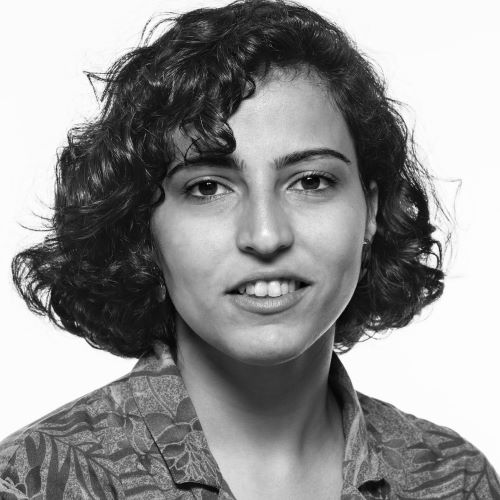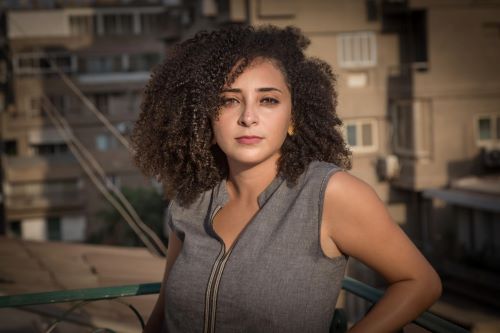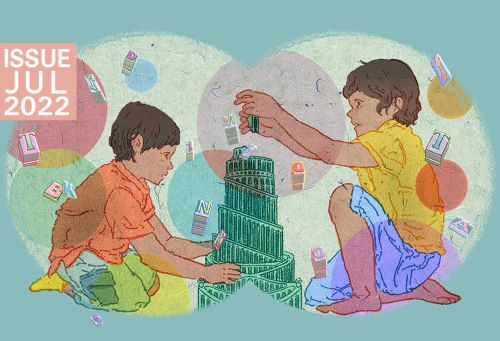Lot’s wife stands near the entrance, deformed more radically by the artist thanshe had ever been by the Lord. The artist didn’t preserve her salty body;instead, he restored her in bronze, crafting a prisoner of eternity. She can’t visitthe neighbors to gossip about her new visitors; she can’t even cross the gallery’sthreshold. Mummified and silent, she overhears fleeting conversations, surveilscountenances with incurious eyes. People of various races— jinn, humans, andangels—walk past her daily. In a past life, she squirmed if she had to carrystrangers’ stories in her belly—she would wander the neighborhood, disgorgingone tale after another.She is no longer a threat to secrets. Now, Lot’s wife pays the price forher fleeting nostalgia, her passion for the past, which compelled her to take one lastlook at Sodom. Looking back, she barely managed to archive the colors of herlife, barely captured the morning’s scent before it went missing, together withgeography. She barely swallowed the language whose extinction would turn herdreams obsolete. At the border checkpoint, a migrant is not allowed to occupyherself with anything but the present moment. It has been said that in turningback, she had compromised the identity of the Lord. Or that in her gut, shebelieved Sodom innocent, wrongly battered to dust.Perhaps if Lot’s wife had waited until she got to the cave before lettingnostalgia overwhelm her, the plot of cosmology would have gone in an entirelydifferent direction. In fact, it might have ended in that cave, and left us inpeace. Why couldn’t the Lord understand that all she wanted was to write apoem about ruins? Is it because men have a sole claim to ruin?She looks tiny on the plinth; her head like a newborn with no talent for wailing.The artist has stripped Lot’s wife of her limbs. Perhaps he feared she wouldescape the gallery, and travel back to the underworld.
Lot’s Wife
Feature Date
- November 6, 2022
Series
- Translation
Selected By
Share This Poem
Print This Poem
English Copyright © 2022 by Sara Elkamel.
All rights reserved.
Reproduced by Poetry Daily with permission.

Mona Kareem is the author of three poetry collections. She has held fellowships and residencies with Tufts University, Princeton University, Poetry International, Arab-American National Museum, National Centre for Writing in Norwich, UK, and Forum Transregionale Studien. She is a recipient of a 2021 National Endowment for the Arts literary grant. Her work has been translated into nine languages, and appeared (in English) in LitHub, The Common, Brooklyn Rail, Michigan Quarterly Review, Fence, Ambit, Poetry London, Los Angeles Review of Books, Asymptote, Words Without Borders, Poetry International, English PEN, Modern Poetry in Translation, Two Lines, and Specimen. Kareem holds a Ph.D. in comparative literature from the State University of New York at Binghamton. Her translations include Ashraf Fayadh’s Instructions Within (nominated for a Best Translated Book Award), Ra’ad Abdulqadir’s Except for this Unseen Thread, and Octavia Butler’s Kindred.

Sara Elkamel is a poet, journalist and translator currently based in Cairo. She holds an MA in arts journalism from Columbia University and an MFA in poetry from New York University. Her poems have appeared in Poetry Magazine, The Yale Review, MQR, Four Way Review, The Cincinnati Review, The Adroit Journal, Poet Lore, Poetry London, Best New Poets ’20 & ’22, Best of the Net ’20, among others. She is the author of the chapbook “Field of No Justice” (African Poetry Book Fund & Akashic Books, 2021).

July 2022
Taipei City
Editor-in-Chief
Lee Yew Leong
Assistant Managing Editors
Daljinder Johal
Malak Khalil
Marina Martino
Samuel Miller
Janet Phillips
Lindsay Semel
Poetry Editor
Lee Yew Leong
Winner of the 2015 London Book Fair’s International Literary Translation Initiative Award, Asymptote is the premier site for world literature in translation. We take our name from the dotted line on a graph that a mathematical function may tend toward, but never reach. Similarly, a translated text may never fully replicate the effect of the original; it is its own creative act.
Our mission is simple: to unlock the literary treasures of the world. To date, our magazine has featured work from 105 countries and 84 languages, all never-before-published poetry, fiction, nonfiction, drama, and interviews by writers and translators such as J. M. Coetzee, Patrick Modiano, Herta Müller, Can Xue, Junot Díaz, Ismail Kadare, David Mitchell, Anne Carson, Haruki Murakami, Lydia Davis, Ann Goldstein, and Deborah Smith.
Poetry Daily Depends on You
With your support, we make reading the best contemporary poetry a treasured daily experience. Consider a contribution today.



